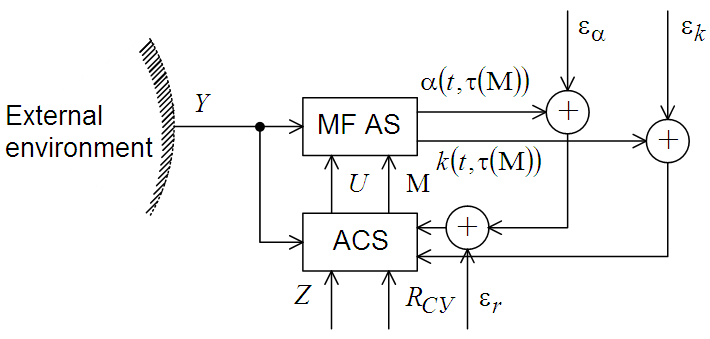Application of Fuzzy Algorithms for Controlling the Modes of Solar Panels in Technological Monitoring at Peak Load
Main Article Content
Abstract
The functional structure of geoecological and technological monitoring systems is analyzed. It is shown that the complication of the multifunctional automated system of geoecological and technological monitoring (MF AS) and the increase in its dynamics aggravates uncertainty of its condition estimation. An uncertainty model of the state of a multifunctional automated system of geoecological and technological monitoring has been developed. To implement the model, fuzzy sets of linguistic estimates fluctuating in time are obtained. The application of fuzzy algorithms to control the modes of solar panels and the detection of failures in thermoelectric systems has been carried out. As a result of the simulation, an increase in the efficiency of the thermoelectric system was revealed by reducing peak loads by 28% and, accordingly, reducing the probability of failures by almost 2 times.
Article Details
References
Kuzichkin O.R., Dorofeev N.V., Tsaplev A.V., Kuligin M.N., Kholkina N.E. Methods and means of automated geodynamic control and geo-ecological monitoring // Radio engineering and telecommunication systems. 2014. No. 1 (13). pp. 63-72.
Sharapov, R., Kuzichkin, O. Geodynamic Monitoring in Area of Nuclear Power Plant. Applied Mechanic and Materials. 2013; 492:556–560.
Galchenko Yu.P., Kalabin G.V., Ozaryan Yu.A. Methods of geoinformation monitoring of natural and technical systems based on remote sensing data // Proceedings of Tula State University. Earth sciences. 2020. No. 1. pp. 68-78.
Romanov E.V., Leletsky A.V., Labunin K.A. Principles of building information systems for geo-ecological monitoring // Achievements of science and education. 2019. No. 8-1 (49). pp. 31-32.
Dorofeev, N.V., Kuzichkin, O.R., Eremenko V.T. The method of selection of key objects and the construction of forecast function of the destructive geodynamic processes. 16th International Multidisciplinary Scientific GeoConference SGEM, Bulgaria, 28 June–7 July; Albena, Bulgaria, 2016; 1, 883–890.
Surzhik, D.I., Kuzichkin, O.R., Vasilyev, G.S. An integrated approach to the construction of energy-saving trigeneration systems for objects of the agro-industrial complex. International Journal of Engineering Research and Technology, 2021, 13(12), ???. 4622–4626
Dorofeev N.V., Orekhov A.A. Service-oriented architecture of geographical information and analytical system of geoecological monitoring // Radio engineering and telecommunication systems. 2012. No. 3 (7). pp. 45-48.
Monitoring, modeling and forecasting of natural hazards and emergencies: Collection of materials of the 10th All-Russian Scientific and Practical Conference, October 19, 2020, Zheleznogorsk – Publishing House: Siberian Fire and Rescue Academy of the Ministry of Emergency Situations of Russia, 2020. - 366 p.
Pozharkova I.N. Efficiency improving of emergency monitoring and forecasting based on the information system // Siberian Journal of Science and Technology. 2020. ?. 21. ? 3. ?. 323-332.
Pivovarova I.I. GIS in the gas supply system for monitoring, management and prevention of emergency situations // National security and strategic planning. 2021. No. 3 (35). pp. 106-111.
Ruchkin V.N., Kolesenkov A.N., Fulin V.A., Pikulin D.R. Intelligent monitoring systems for natural and man-made emergencies // Izvestiya Tula State University. Technical sciences. 2018. No. 2. pp. 11-26.
Ruchkin V.N., Kostrov B.V., Kolesenkov A.N. Three-level express monitoring of emergency situations based on intelligent CFS // Proceedings of Tula State University. Technical sciences. 2017. No. 2. pp. 164-172.
Murashko N.I., Andreenko A.V. Multi-agent system of monitoring and forecasting of emergency situations // Big data and advanced analytics. 2020. No. 6-2. pp. 388-398.
Ruchkin, Vladimir & Kolesenkov, A. & Fulin, Vladimir & Drozdova, V.. (2016). Analysis of technogenic environment by means of cyber-physical systems. Vestnik of Ryazan State Radio Engineering University. 59. 122-128. 10.21667/1995-4565-2016-57-3-122-128.
Sistla A. Prasad, Zefran M., Feng Z. "Runtime monitoring of stochastic cyber-physical systems with hybrid state," in RV, 2012.
Gubskaya O.A., Krivtsov S.P., Zakharchenko A.S., Ksenofontov D.A. Modeling of monitoring and control subsystem of automated control system of special purpose communication network // Issues of defense technology. Series 16: Technical means of countering terrorism. 2020. No. 7-8 (145-146). pp. 25-29.
Orkin V.V. A model of functioning of an automated control system that takes into account performance monitoring information in network infrastructure nodes // Intelligent technologies in transport. 2019. No. 1 (17). pp. 13-18.
GOST R 58606-2019. System and software engineering. Measurement process
Sokolov S.A., Stockipny A.L. Diagnostic model for the tasks of identifying patterns of functioning of components of a corporate IP network database // Eastern European Journal of Advanced Technologies. 2009. Vol. 5. No. 2 (41). pp. 4-8.
Zhukova N.A. General and particular tasks of multilevel synthesis of models of monitoring objects // Scientific and technical information. Ser. 2, Information processes and systems. – 2019. No. 11. pp. 16-22.
Bychkov, E. D. Mathematical models of digital telecommunication network state management using the theory of fuzzy sets/ E. D. Bychkov – Omsk: Publishing House of OmSTU, 2010. - 236 p.
GOST R ISO 19439-2008. Enterprise integration. The basis of enterprise modeling.
Jayatilleke Sh., Lai R. A Systematic Review of Requirements Change Management. Information and Software Technology. 2018. Vol 93. Pages 163-185. ISSN 0950-5849. https://doi.org/10.1016/j.infsof.2017.09.004.
Dasanayake S., Aaramaa S., Markkula J., Oivo M. Impact of requirements volatility on software architecture: How do software teams keep up with ever?changing requirements? Journal of Software: Evolution and Process. 2019, 31:e2160. https://doi.org/10.1002/smr.2160.
Kulikov G.G., Antonov V.V., Antonov D.V.. Construction of a formal domain model using fuzzy clustering // Bulletin of UGATU. 2011. Vol. 15. No. 5. pp. 3-11.
Ignatiev M., Marli V., Mikhailov V., Spesivtsev A. 2016. A multi-model approach to city management in conditions of uncertainty. Communications in the field of computer engineering and computer science. Digital transformation and global society. The First International Conference, DTGS 2016, pp. 469-477.
Shcherbatov, I.A. Management of complex weakly formalizable multicomponent systems: monograph / I. A. Shcherbatov. Rostov: Publishing house of the YUNTS RAS, 2015.-268 p.
Rodr??guez Rosa M., Mart??nez Luis, Herrera Francisco. Hesitant Fuzzy Linguistic Term Sets for Decision Making. IEEE TRANSACTIONS ON FUZZY SYSTEMS, VOL. 20, NO. 1, FEBRUARY 2012. IEEE Transactions on Fuzzy Systems 20(1):109-119.

